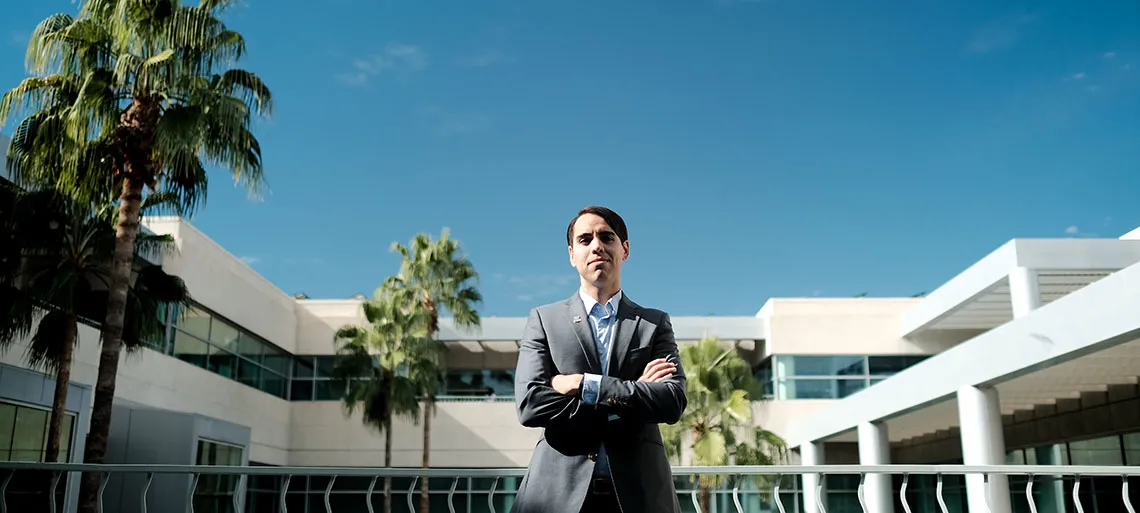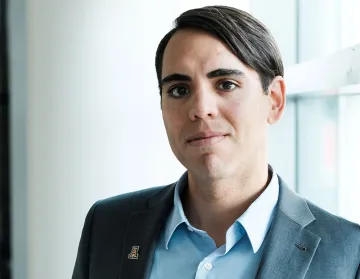Calculated Decisions: Christopher Stemple ’19 MBA
Christopher Stemple ’19 MBA | Program Manager, Texas Instruments

“Only about two percent of Texas Instruments’ business is in calculators,” says Christopher Stemple ’19 MBA as he discusses his recent transition at the tech firm’s research and development office in Tucson. “Calculators are what many people know about us, but in fact most of our business comes from semiconductor-related research and development and integrated circuit manufacturing.”
It’s a business-to-business model that Stemple finds fascinating, particularly since he has served on both the marketing and development sides of the company. During his time in the Eller College of Management’s 21-month Executive MBA program, he moved from product marketing to program management. Given his technical background—he graduated with a degree in electrical and computer engineering from the University of Arizona in 2010, followed a year later by Arizona master’s degrees in biomedical engineering and engineering management—that’s a logical transition.
What may seem less logical is the decision to pursue an MBA: “It’s a question I get asked all the time—why pursue an MBA when you have an engineering management degree?” Answer: the MBA offered something his other degrees couldn’t—“an opportunity to expand and diversify my business skillset.”
Even though he ran his own successful consulting business for over five years before joining Texas Instruments in 2015, Stemple says: “I didn’t have a formal business background and knew very little about actual business operations. With the MBA, I can now see things from a higher-level view. Now I consider more fully the mission and vision of an organization as well as the overall market conditions when I make product development decisions.”
For Stemple, there was a lot to like about the Executive MBA program and its hybrid format, from the flexible schedule that consists of spending one weekend a month in Phoenix while completing coursework and group projects online to a cohort rich in business experience.
“One of the greatest returns on investment for me,” he says, “was the opportunity to interface with the other students. It was refreshing to see the kinds of challenges that different members of my class had—offering insights and strategic thinking that never would have been possible without the cohort’s diverse, accomplished business leaders.”

Stemple’s MBA cohort shared an international experience, as well. They visited Jakarta, Indonesia as part of the MBA’s global business experience, an enlightening experience not only because of the distinct culture but also because of “interesting challenges from a business standpoint that we as a class were shocked to learn.”
For example, the students met with a large Indonesian company that deals primarily with the online sale of consumer goods. In Indonesia, however, over half the population is unbanked and thus operates on a cash basis. “How do you operate an online business in an economy that is heavily cash-based, without any way to digitally secure payment?” Stemple asks. The solution: outsource to local “mom and pop” corner stores and provide them point-of-sale terminals. A purchase can then be made online and the buyer can walk down to the store to pay that authorized reseller in cash. “It's a business challenge that we take for granted here in America, and that’s a perspective we couldn’t have gained without that international trip,” he says.
Stemple’s transition from product marketing to program management was alluring in part because of that global focus. Though he no longer travels as extensively as he did as a product marketer, he works with product development and manufacturing teams in Asia and Europe on a daily basis.
As he embraces a more global, business-oriented mindset, Stemple acknowledges that his background is still rooted in numbers and processes. “But as long as I remember to step back and consider critical decisions both analytically and creatively, I keep moving forward,” he says. And moving forward is precisely the type of transition he’s calculated.
Ready to transition your career to a higher level? Explore the Eller Executive MBA program.

